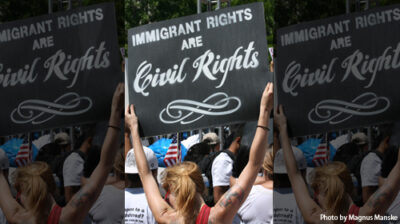
Hispanic Interest Coalition of Alabama v. Bentley
What's at Stake
The Alabama state legislature passed a draconian anti-immigrant law in June, 2011, the toughest of several state laws modeled after Arizona’s SB 1070. Like the Arizona law, SB 56 authorized police to ask for proof of citizenship or immigration status during a traffic stop based on “reasonable suspicion” that the person was an undocumented immigrant. The law went even further than Arizona’s, with provisions that required public school officials to verify the immigration status of children and their parents, that made it a crime for undocumented immigrants to solicit work, and criminalized Alabamians for ordinary, everyday interactions with undocumented individuals like renting a mobile home or offering a ride.
Summary
Shortly after its passage, the American Civil Liberties Union, along with a coalition of civil rights groups, filed a class action lawsuit charging that HB 56 unlawfully subjected Alabamians - including countless U.S. citizens and lawful permanent residents - to unlawful search and seizure, in violation of the Fourth Amendment. The lawsuit also challenged other provisions, including the one that would bar many immigrants from attending public colleges or universities, and another that would have made it a crime to work as a day laborer. The suit also charged that HB56 illegally interfered with federal government’s exclusive power over immigration matters.
The federal district court blocked many provisions of the law. But because it allowed other unconstitutional provisions to go into effect, the ACLU and coalition partners appealed to the U.S. Court of Appeals for the 11th Circuit in September, 2011. Later than year, and in 2012, the 11th Circuit blocked key provisions of HB 56. The court invalidated those provisions of Alabama’s law that required schools to verify the immigration status of incoming students; that criminalized failure to carry immigration documents; and that invalidated contracts with undocumented immigrants; and that made it a crime to transport undocumented immigrants.
Those same provisions of HB56, and those blocked by the federal district court, were permanently blocked in October 2013, when the state of Alabama agreed to a settlement in the lawsuit (the Alabama Legislature also amended HB 56 in 2012 in ways that substantially limited two of the blocked provisions). The settlement also put limits on the “show me your papers” provision of the law by forbidding local police from holding someone solely to check immigration status or solely because the person is undocumented.
Legal Documents
-
11/14/2011
Hispanic Interest Coalition of Alabama v. Bentley - Appellants' Opening Brief
Date Filed: 11/14/2011
Affiliate: Alabama
Download Document-
11/14/2011
Hispanic Interest Coalition of Alabama v. Bentley - Appellant's Opening Brief
Date Filed: 11/14/2011
Affiliate: Alabama
Download Document-
10/29/2013
Hispanic Interest Coalition of Alabama v. Bentley - Proposed Final Order
Date Filed: 10/29/2013
Affiliate: Alabama
Download Document-
10/14/2011
Hispanic Interest Coalition of Alabama v. Bentley - US court of Appeals 11th Circuit Decision
Date Filed: 10/14/2011
Affiliate: Alabama
Download Document-
10/10/2014
Doe V. Hobson-Settlement Agreement
Date Filed: 10/10/2014
Affiliate: Alabama
Download Document-
10/10/2014
Doe V. Hobson-Joint Motion to Dismiss
Date Filed: 10/10/2014
Affiliate: Alabama
Download Document-
10/07/2011
Hispanic Interest Coalition of Alabama v. Bentley - Motion for Preliminary Injunction
Date Filed: 10/07/2011
Affiliate: Alabama
Download Document-
10/07/2011
Hispanic Interest Coalition of Alabama v. Bentley - Motion for Preliminary Injunction Pending Appeal and for Expedited Appeal
Date Filed: 10/07/2011
Affiliate: Alabama
Download Document-
10/05/2011
Hispanic Interest Coalition of Alabama v. Bentley - Judge's Order
Date Filed: 10/05/2011
Affiliate: Alabama
Download Document-
10/02/2012
Hispanic Interest Coalition of Alabama v. Bentley - Plaintiffs’ Notice of Supplemental Evidence Re: Emergency Motion to Enjoin Portions of HB 56 Pending Appeal
Date Filed: 10/02/2012
Affiliate: Alabama
Download Document-
10/02/2011
Hispanic Interest Coalition of Alabama v. Bentley - Notice Regarding Supplemental Evidence
Date Filed: 10/02/2011
Affiliate: Alabama
Download Document-
10/02/2011
Plaintiffs’ Notice of Supplemental Evidence Re: Emergency Motion to Enjoin Portions of HB 56 Pending Appeal - Ex. 5
Date Filed: 10/02/2011
Affiliate: Alabama
Download Document-
10/02/2011
Plaintiffs’ Notice of Supplemental Evidence Re: Emergency Motion to Enjoin Portions of HB 56 Pending Appeal - Exhibit 3
Date Filed: 10/02/2011
Affiliate: Alabama
Download Document-
10/02/2011
Plaintiffs’ Notice of Supplemental Evidence Re: Emergency Motion to Enjoin Portions of HB 56 Pending Appeal - Exhibit 6
Date Filed: 10/02/2011
Affiliate: Alabama
Download Document-
10/02/2011
Plaintiffs’ Notice of Supplemental Evidence Re: Emergency Motion to Enjoin Portions of HB 56 Pending Appeal - Exhibit 1
Date Filed: 10/02/2011
Affiliate: Alabama
Download Document-
10/02/2011
Plaintiffs’ Notice of Supplemental Evidence Re: Emergency Motion to Enjoin Portions of HB 56 Pending Appeal - Exhibit 2
Date Filed: 10/02/2011
Affiliate: Alabama
Download Document-
09/29/2011
Emergency Motion to Enjoin Portions of HB 56 Pending Appeal and Memorandum in Support and Notice of Interlocutory Appeal by All Plaintiffs
Date Filed: 09/29/2011
Affiliate: Alabama
Download Document-
09/29/2011
Hispanic Interest Coalition of Alabama v. Bentley - Notice of Interlocutory Appeal by All Plaintiffs
Date Filed: 09/29/2011
Affiliate: Alabama
Download Document-
09/28/2011
Hispanic Interest Coalition of Alabama v. Bentley - Memorandum Opinion, U.S. District Court for the Northern District of Alabama
Date Filed: 09/28/2011
Affiliate: Alabama
Download Document-
08/29/2011
Order Granting Temporary Injunction of HB 56
Date Filed: 08/29/2011
Affiliate: Alabama
Download Document-
08/20/2012
Hispanic Interest Coalition of Alabama et al. v. Alabama - 11th Circuit court of Appeals decision, Aug. 20, 2012
Date Filed: 08/20/2012
Affiliate: Alabama
Download Document-
08/20/2012
Hispanic Interest Coalition of Alabama v. Bentley - Opinion
Date Filed: 08/20/2012
Affiliate: Alabama
Download Document-
07/21/2011
Hispanic Interest Coalition of Alabama, et al. v. Governor Robert Bentley - Preliminary Injunction
Date Filed: 07/21/2011
Affiliate: Alabama
Download Document-
07/08/2011
Hispanic Interest Coalition of Alabama v. Bentley - Complaint
Date Filed: 07/08/2011
Affiliate: Alabama
Download Document-
07/06/2012
Hispanic Interest Coalition of Alabama v. Bentley - Plaintiffs-Appellants/Cross-Appellees' Supplemental Brief
Date Filed: 07/06/2012
Affiliate: Alabama
Download Document-
07/06/2012
Hispanic Interest Coalition of Alabama v. Bentley - Supplemental Brief for Appellees/Cross-Appellants on Arizona v. United States and HB658
Date Filed: 07/06/2012
Affiliate: Alabama
Download Document-
03/08/2012
Hispanic Interest Coalition v. Bentley: 11th Circuit Order Enjoining Sections 27 and 30 of H.B. 56
Date Filed: 03/08/2012
Affiliate: Alabama
Download DocumentPress Releases
Civil Rights Coalition Victorious in Challenge to Alabama's Anti-Immigrant 'Scarlet Letter' Law
Civil Rights Coalition Victorious in Suit Against Alabama’s Anti-Immigrant Law
ACLU and Civil Rights Coalition Ask Court to Block Alabama’s Anti-Immigrant Law
ACLU and Civil Rights Coalition File Lawsuit Charging Alabama’s Racial Profiling Law is Unconstitutional
